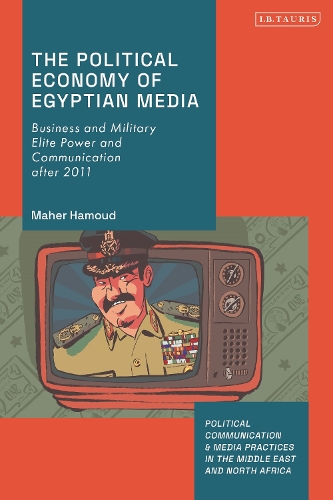
The Political Economy of Egyptian Media: Business and Military Elite Power and Communication after 2011
(Paperback)
Available Formats
Publishing Details
The Political Economy of Egyptian Media: Business and Military Elite Power and Communication after 2011
By (Author) Maher Hamoud
Bloomsbury Publishing PLC
I.B. Tauris
26th December 2024
United Kingdom
Classifications
Tertiary Education
Non Fiction
Media, entertainment, information and communication industries
Middle Eastern history
302.230962
Physical Properties
Paperback
232
Width 154mm, Height 232mm, Spine 14mm
360g
Description
This book critically analyses the hegemony of Egypts business and military elites and the private media they own or control. Arguing that this hegemony requires the exercise of power to maintain consent under changing conditions such as the 2011 uprising and the 2013 military coup, the book answers the central question of why and how Egypts ruling elites control the media. Situated within the interdisciplinary domain of critical political economy (CPE), the book focuses on popular privately-owned newspapers and TV channels and their ownership using a qualitative approach involving fifteen interviews conducted over seven years with key actors and experts in the Egyptian media landscape for unprecedented insight. As the first book on the political economy of Egyptian media, The Political Economy of Egyptian Media serves as a case study and a country profile and will be of appeal to scholars and experts of Middle Eastern studies, political sciences, media and the political economy of communication, among others.
Reviews
Adopting a critical political economy approach and drawing on interviews with media experts, Hamoud problematizes the notion that a privatized media can be truly independent and instead, convincingly shows how vested economic and political interests control, shape, and dominate the media and determine the content of public discourse. The book addresses the puzzle of how the Egyptian people demanded the removal of long ruling authoritarian President Hosni Mubarak only to end up supporting a military coup that established military rule. By tracing the evolution of the media landscape in post-uprising Egypt, Hamoud demonstrates how the media has played an important role in legitimizing power relations and determining which discourses became legitimate and dominant, and which discourses were prohibited and banned. By showing how media control plays an important role in shaping public opinion and political outcomes, Hamoud makes an important contribution to media studies and political economy. -- Angela Joya * Carleton University *
An important and much-needed book, filling a large gap in the literature on media and power in Egypt. The Political Economy of Egyptian Media takes on the intimate links between political, economic, and media hegemonies in pre and post-revolutionary Egypt. Maher Hamoud shows how a political-economic-media nexus dating back to Nassers era has been constituted in shifting ways, but that there has also been a continuity in advancing the control of Egypts elites. These continuities are key, but so too is how Sisis Egypt has shifted to prioritizing the control by military institutions of Egypts media. Hamouds insights are essential for understanding both continuities in authoritarianism in Egypt as well as the distinct specifics of how the Sisi regime maintains his power. -- Anthony Tirado Chase * Professor of Diplomacy and World Affairs, Occidental College, USA *
This is a ground-breaking book that adds a crucial layer to our understanding of autocratic resilience in Egypt. Clientelism, repression, electoral manipulations are tools of domination that have been well described elsewhere. But the book illuminates why none of this would has sufficed in consolidating autocracy if it was not for the hegemony in shaping minds and values that a tight control over the media has provided. -- Ishac Diwan * Paris School of Economics, France *
Author Bio
Maher Hamoud is an Associate Scholar at the University of Leuven, Belgium. He teaches political economy, and his research focuses on development politics in the Global South.
